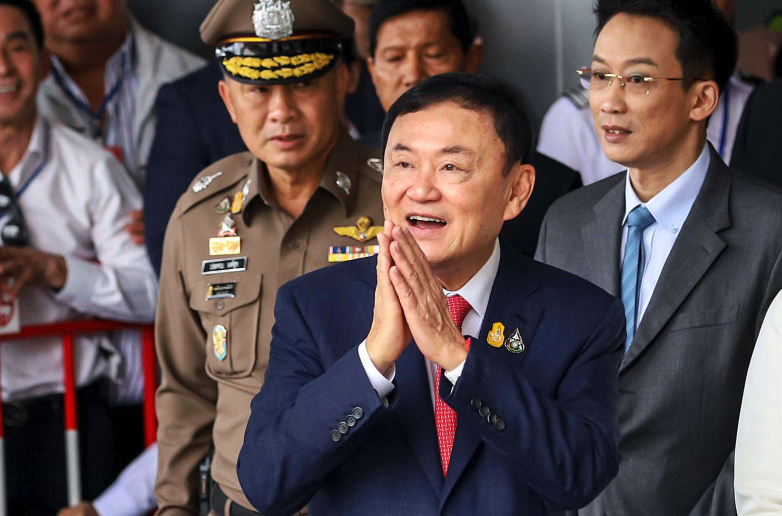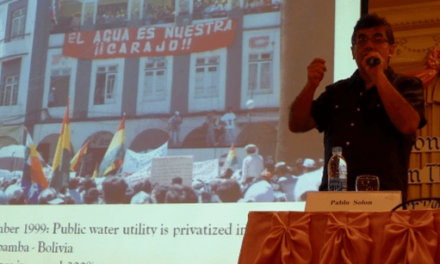By Kheetanat Synth Wannaboworn and Walden Bello*
Southeast Asia Political Dynasties Project I: Thailand
This is the first in a series of investigative projects exploring the structure and dynamics of governance systems in selected Southeast Asian countries. For other articles in this series, visit here.
After months of Thailand being put on hold as the country’s political adversaries tried to figure a way out of the surprising results of the May elections, a solution was finally reached among contending parties on the third week of August. It was a victory for the establishment, a modus vivendi among its different factions.
The Deal
The elements of the deal were: Thaksin Shinawatra, the self-exiled former Prime Minister, would return to Thailand with a promise of lax treatment for his alleged crimes; The Pheu Thai Party, Thaksin’s personal political vehicle, would lead a governing coalition that would include two defeated parties associated with the powerful military; and a freezing out of the Move Forward Party that had won the most seats in the May parliamentary elections.
The deal that united Thaksin with his former enemies, the military and the Royal Palace, drew anger, consternation, and confusion throughout the country. Former Foreign Minister Kasit Piromya, a Thaksin foe who has become a severe critic of the military and the lese majeste law on penalizing people accused of defaming the royalty, summed the situation up thus: “The reality is that this government is composed of personalities from the conservative establishment side. Arch-enemies, Thaksin and the generals are now together as one to put up a stand (maybe the last one) against the forces of change. We must be reminded that Thaksin has all along been part of the establishment. But he wanted to monopolize and was opposed by the rest. Now various elements of the establishment have rejoined one another. The Thai political arena is now a struggle between the established elites and the masses. More dramas will surely come to delight and bewilder all of us.”
On the other hand, spokespeople for the Pheu Thai party said, the deal, which would make real estate mogul Srettha Thavisin prime minister, was necessary to end nearly three months of political uncertainty owing to the absence of a ruling parliamentary coalition.
The Promise
The country’s latest crisis erupted when the MFP unexpectedly won the most votes in the parliamentary elections of May 14, 2023. It won 151 seats, besting its coalition partner, the Pheu Thai party, that raked in 141 seats. Left in the dust were the parties controlled by the ruling military regime that gathered a measly 76 seats.
MFP’s rise was nothing short of mercurial. Founded just five years ago, in 2018, it came in third in the parliamentary elections of 2019. Then, coming in first in 2023, it won 14 million votes, or 40 percent of votes cast, up from 13 per cent in 2019. It frustrated every legal maneuver that the military-controlled Constitutional Court threw at it. The Court disqualified Future Forward founder Thanathorn Juangroongruangkit from serving in Parliament, along with several other winners in the 2019 elections. The Court followed this up by dissolving Future Forward and banning its executives from politics for 10 years in February 2020, only to see it resurrected as Move Forward a month later, with a new leader, Pita Limjaroenrat, who declared that “Move Forward is the new chapter of Future Forward.”
Wheeling and Dealing
To be Prime Minister, Pita had to get 376 votes from the 750 members of the bicameral National Assembly. He already had the votes of the the eight-party opposition coalition but, going into the July 13, he needed to secure more, and this had to come either from the rest of the lower house or from the Senate, or both. Parliament concluded a two-hour voting session with Pita securing 324 votes in his favor, 182 votes against and 199 abstentions in the first round, falling short of the 375 votes needed to become premier by 51 votes.
Other rival parties, such as the formerly influential Democrats that suffered a stunning collapse to only 25 seats, had refused to come to the aid of what they saw as an upstart party. Another party, the Bhumjaithai Party, which fancied itself as a “kingmaker,” refused to support Pita as it was convinced MFP wanted to overthrow the monarchy owing to its proposal to amend Article 112 of the Constitution, the notorious lese majeste or royal defamation law.
But the most decisive force that shaped the outcome of July 13 were the senators–all of whom were appointed by the military, who considered themselves the “guardians of the Kingdom’s three pillars” – Nation, Religion, and the King. Pita hardly picked up any votes from this solid reactionary bloc.
The Parliament reconvened on July 19, but Pita’s opponents refused to have a second renomination on the grounds that he had already been rejected a week earlier. As the debate ensued, the Constitutional Court separately announced Pita had been suspended as a lawmaker over an allegation he violated election rules by holding shares in a private firm. This was the same flimsy legal basis on which the Constitutional Court disqualified Future Forward founder Thanathorn Juangroongruangkit, after the 2019 elections. At this point, it became very clear that the powerful establishment was not willing to have Move Forward lead a coalition. Pheu Thai at that point led the process of establishing a new government and, during a month long period of intense negotiations, junked Move Forward and moved to an accommodation with other parties, including the two defeated parties connected with the generals that had ruled the country for nine miserable years.
Thaksin’s return to Thailand to face lenient treatment was apparently the deal that opened the way to a governing alliance among former foes. Hours after his return on August 20, Parliament elected his man Srettha, with 482 votes from the 727 politicians, as prime minister. The only significant party to vote against Srettha in the parliament election was Move Forward and its 149 MPs. The Royal Palace promptly signed off on the results.
Srettha is now leading a fragile coalition of 11 parties. In the Srettha Administration which officially started on September 2, 2023, Pheu Thai secured eight cabinet posts and nine deputy cabinet posts. The parties of the military – Palang Pracharath and United Thai Nation – received two cabinet posts and two deputy posts each. Pheu Thai further revealed that the coalition had agreed to “support” Pheu Thai’s platform of boosting the economy, increasing the minimum wage, ending mandatory conscription, the continued legalization of medical marijuana, and amending the constitution to make the country “become more democratic,” while not touching the royal defamation law.
Profiles of Political Parties that Participated in the 2023 General Election
1. Move Forward Party (MFP)

Move Forward Party (MFP) was formed in March 2020, shortly after the Constitutional Court’s decision to disband the Future Forward Party (FFP) and impose a decade-long prohibition on its leaders from holding political office. Pita Limcharoenrat, the leader of MFP, proclaimed that the party marked a new chapter of the FFP, with the aim of creating a new ethical norm for Thai politics, promoting a far-sighted political vision, and pushing a progressive policy agenda. During the 2023 General Election, MFP launched 300 policies that targeted the return of democracy, reform of the lese majeste law, professionalization of the military, welfare policies, and the decentralization of Thailand’s politics and economy.
In the 2019 General Election, MFP’s predecessor FFP won 81 out of 500 seats, representing 17.53% of the vote. This made them the third-largest party in the Parliament and granted them the highest representation of MPs in Bangkok. The 2023 General Election brought a sweeping victory for MFP with 151 seats in the lower house; this represented an increase from 6.3 million to 14 million voters from the last election. Like FFP earlier, MFP currently faces threats of dissolution by the Constitutional Court, with the case against it framed around its lese majeste reform proposal.
2. Pheu Thai Party (PTP)
The Pheu Thai Party (PTP) was established in 2007 under the leadership of Thaksin Shinawatra and his family. The Party together with its predecessors – Thai Rak Thai Party (2001-2007) and People’s Power Party (2007-2008) – held the largest number MP seats in the parliament from the 2001 to the 2019 general election, with a remarkable landslide triumph that secured 377 out of 500 seats during the 2005 general election. Its popularity came directly from the parties’ populist policy packages, especially the flagship universal healthcare scheme, debt moratorium plan for farmers, and the establishment of a 1-million-baht village fund to alleviate poverty and empower local administration, particularly in marginalized regions of Thailand. These transformative developments swiftly reshaped the landscape of Thailand’s historically elitist politics, ushering in an era of populist politics.
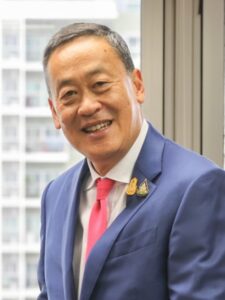
The Shinawatra parties posed a fundamental challenge to the traditional elites. The Shinawatra administrations led by Thaksin and his sister Yingluck were ended by military coups in 2006 and 2014, respectively. The Constitutional Court became the tool of the establishment for dissolving TRT and PPP on the ground of electoral law “violations” and “election fraud” in 2007 and 2008, respectively. The dissolution of the parties created a widespread feeling of injustice among their members and active sympathizers–the so-called “Red-Shirts”—who staged a series of anti-coup protests from 2006 to 2010. In 2010, the Red-Shirt mobilizations were brutally smashed by the military, with almost 100 people killed in the heart of Bangkok. A May 25, 2010 report released by Focus described the aftermath of the “Battle of Thailand” thus: “Captured Red-shirt leaders and militants are treated like POWs [prisoners of war] and the lower class Red-shirt mass base like an occupied country. No doubt about it, a state of civil war exists in this country, and civil wars are never pretty.”
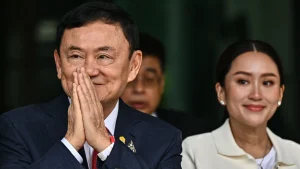
Pheu Thai Party was predicted to be the frontrunner in the 2023 general election before the unforeseen victory of Move Forward Party. However, PTP was able to lead the government’s formation process after the Parliament refused the renomination of MFP’s PM candidate Pita. The PTP-led Coalition Government is composed of 11 parties, including the military avatars: Palang Pracharath (PPRP) and United Thai Nation (UTN). Upon the return to Thailand of Thaksin Shinawatra from 15 years of self-exile, the Pheu Thai candidate for prime minister Srettha Thavisin got 482 out of 727 votes, more than the 375 required. On 1 September 2023, Thaksin Shinawatra received the royal pardon commuting his eight-year prison term to one year. The swift compromise between Pheu Thai and the establishment angered many Red Shirts, especially since during the election campaign, it had promised not to collaborate with the coup-makers’ parties. After the deal, Pheu Thai lost popularity relative to MFP in a national poll, leading many to believe that MFP could win a landslide victory in the next general election.
3. Bhumjaithai Party (BJT)
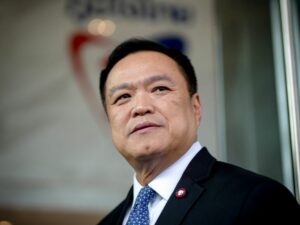
The Bhumjaithai Party came the third in the 2023 general election. Founded in 2008, the party’s base is in Buriram province, in the rural Northeast part of the country that borders Cambodia. Anutin Charnvirakul, the party’s leader, was the Minister of Health in Prayut Administration (2019-2023) when the party spearheaded the decriminalization of cannabis. During COVID-19, Anutin gained notoriety by favoring the selection of China’s Sinovac Biotech for Thailand’s mass inoculation program and for making no attempt to join COVAX – the World Health Organization’s initiative for equitable access to vaccine. He also refused to limit entries to Thailand from China when other countries started closing their borders to limit the global spread of the virus.
Bhumjaithai party placed itself as the kingmaker in the election where it was offered four ministerial seats in the Srettha Administration. The party was able to win 71 seats out of 500 seats in the lower house. Following the 2023 election, Bhumjaithai declined to collaborate with the Move Forward Party, taking a stand similar to that of most senators to invalidate MFP on the ground of MFP’s proposed reform of the lese majeste law. Anutin’s fortune stems from his ownership of Thailand’s third biggest construction firm, Sino-Thai Engineering and Construction Pcl. This provides financing for his political party and for building close ties among elites across the political spectrum, enabling him to negotiate his party’s inclusion in the Pheu Thai-led coalition government.
4. Palang Pracharath Party (PPRP)
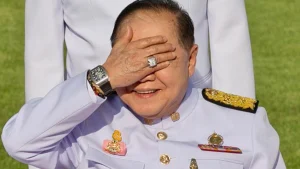
The Palang Pracharath Party was formed in 2018 as a civil-military and ultra-nationalist party. The party has a direct tie with the National Council for Peace and Order (NCPO) – the 2014 coup makers–while attempting to sustain and legitimize the military’s influence and political power through elections. General Prawit Wongsuwon, the deputy prime minister of the Prayut Administration (2019-2023), served as the Party’s leader and also as the prime minister candidate in the 2023 General Election. Prawit is known as the mastermind behind NCPO as well as the key decisionmaker in the Prayut regime. In the 2019 General Election, the party was the second runner up due to the populist policy proposals it advanced during the coup period – naming them the Government’s “Palang Pracharath” program. General Prayut also extensively exercised his power under Section 44 of the Constitution to redraw electoral districts so as to favor the PPRP. Ultimately, Palang Pracharath was able to lead the government after the 2019 General Election, with the assistance of the 2017 military-backed Constitution, which gave the junta’s handpicked 250 senators the authority to vote for the prime minister in the 750-seat parliament. This allowed the continuation of the Prayut Administration in 2019–2023. In the 2023 general election, PPRP was the fourth runner-up, with 40 seats in the lower house.
5. United Thai Nation Party (UTNP)
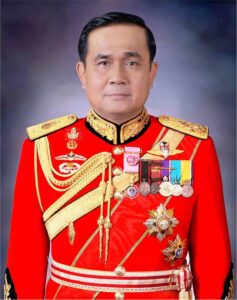
The United Thai Nation Party (UTNP) was formed in 2021, under the leadership of former Prime Minister Prayut Chan-O-Cha. It stemmed from a split in the PPRP after General Prawit Wongsuwon, was nominated as that party’s candidate for prime minister. The party recruited veteran politicians from PPRP and the Democrats, touting Prayut’s self-proclaimed success in controlling COVID-19 pandemic and its program for post-pandemic recovery.
UTNP secured 36 seats in the 2023 General Election, reflecting voters’ rejection of Prayut. Four party members, nonetheless, were given ministerial posts in the Pheu Thai-led Administration; this did not include Prayut, who had announced his withdrawal from politics after the elections.
6. Small parties
The Pheu Thai-led Coalition Government also includes seven small parties which won 1 to 10 seats in the Parliament, allowing it to have a majority of 314 seats in the National Assembly. These parties either have their own electoral bases in provincial Thailand (such as Chart Thai Pattana in Suphan Buri province or Prachachart Party in the southernmost provinces) or have a strong issue-based appeal (such as Seri Ruam Thai Party). The seven parties are: 1) Chart Thai Pattana (10-seat), 2) Prachachart (9-seat), 3) Seri Ruam Thai (1-seat), 4) Chart Pattana Kla (2-seat), 5) Pheu Thai Ruamphalang (2-seat), 6) Plung Sungkom Mai (1-seat), and 7) the Party of Thai Counties (1-seat).
7. Democrat Party
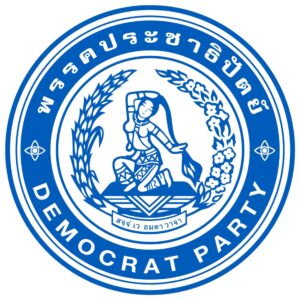
Founded in 1946, the Democrat Party is the oldest party in Thailand. At its start, the party represented the sector of the Thai elite with liberal pretensions. It has placed four prime ministers in office, the last time from 2008-2011, when its leader was Abhisit Vejjajiva. The Democrat Party was one of Pheu Thai’s big rivals until new players emerged after the 2014 coup d’état – the Palang Pracharath and the Future Forward Party (FFP). The Party’s electoral bases are in Southern Thailand and Bangkok, where their supporters are usually swing voters.
The party never recovered from its role in instigating the military’s repression of the Red Shirt insurrection in 2010, its leading the middle-class-based mobilizations in Bangkok that sought military intervention to oust the Yingluck government in 2014, and its opportunistic affiliation with the pro-coup regime following the 2019 elections.
Many political observers agree that the Democrats are becoming irrelevant, fragmented by internal conflicts and with no clear policy direction. The Party could only secure 52 and 25 seats in the 2019 and 2023 general election, respectively. During the formation of the Pheu Thai-led coalition, the Democrats were barred from joining the formation even though smaller parties such as Chart Thai Pattana (10 seats) and Chart Pattana Kla (2 seats) were invited. The leadership vacuum–there was no party leader or secretary general in place during the coalition’s formation—was used as a reason to block the party from the participation.
The Meaning of the May Elections

“Left: Electoral District’s Voting Results, Right: Party List’s Voting Results. Please click the image to visit the interactive map and explore the voting results at https://election66.thaipbs.or.th/result/geo
The deal has largely unsettled and angered most of the electorate, which saw the May election’s results as a clear mandate for fundamental change. Observers have underlined the following points:
–The youth vote, that is, Gen Z and Millennials, made the difference in the electoral outcome. In this connection, it must be pointed out that opposition in the streets spearheaded by young people who defied the military, sporadically at first but more massively in the last few years, created the context for the emergence of an electoral party whose average age of parliamentarians is 37.
–The extremely poor performance of the government coalition, along with that of traditional parties like the Democrats that cooperated with the generals, represented a decisive repudiation of military intervention in politics and a call for the generals to return to the barracks and stay there.
–MFP’s outstripping of its coalition partner Pheu Thai as the country’s leading party, along with the extremely poor performance of the Pheu Thai’s bete noir, the Democrats, may mean that at last the citizenry has moved beyond the “Red” versus “Yellow” divide that wracked Thailand before the coup of 2014. Pheu Thai had mobilized mainly the rural masses of the North and Northeast in support of Thaksin Shinawatra’s populist politics, while the Democrats had agitated Bangkok’s middle classes in support of the country’s traditional elites. During the May 2023 elections, in many areas, notably the North, Northeast, and Bangkok, significant numbers of former red and yellow antagonists found themselves together in the orange MFP camp. Observers cited many instances of families that had split for years into red and yellow factions uniting under the MFP banner. “There are no longer any reds or yellows in our family,” one Bangkokian told us happily. “We all voted for MFP.”
–MFP ran a strikingly different campaign by focusing on issues and policies instead of appealing to people’s traditional personal or party loyalties. Unlike the other parties, it did not buy votes, and this was not only because it had no money to do so but out of principle and a conviction that people were tired of the old personalistic, clientelistic politics. Leading up to the May elections, the party assembled a program based on 300 policy positions, from military reform to LGBTQ rights to animal rights, seeking to show the electorate that it was a large tent that had a place for every voter’s special concern.
“We won the soldiers’ votes,” MP Rome told us at a briefing at the party’s headquarters, commenting on one of the more interesting electoral outcomes. “It showed that enlisted men and women agreed with our platform for military reform, which sought to create a truly professional army, where recruits would not be hazed and people would advance by merit rather than by connections.” Former MP Kunthida Rungruengkiat, who now heads MFP’s Progressive Movement Foundation, added, “I still remember one forum where one personality of a traditional party said, ‘MFP’s brand of politics is a threat to all of us old parties, whether of the government or opposition.’ He was right.”
Prospects for the New Reigning Coalition
Will the “Back from the Future Coalition” be able to defuse the smoldering anger that is the response to its formation?
Some observers are of the opinion that this time, the establishment has overreached and, while people are not yet out in the streets in protest, they will come out eventually, leading to another round of intense street battles, like the ones that led to the military coup in 2014.
Others do not see the governing coalition lasting very long, expecting the infighting among former bitter enemies to resume in short order, especially since there is really no agreement on a common program except to form a government. Behind the scenes the formidable Thaksin and the equally formidable military-backed conservative establishment will be calling the shots, and it’s unlikely they find common ground is they are not to disappoint their constituencies. The mass base of Thaksin, the so-called Redshirts, are expecting his populist agenda to resume, while the elite is determined to make no concessions on the social and economic front.
Coming out of the deal, Thaksin and Pheu Thai are likely to be the big losers, being seen by a significant bloc of former supporters as having betrayed the popular mandate in order to promote the interests of the party and the Thaksin family. Thaksin is seen by many former sympathizers as a has-been. Move Forward has captured their political imagination, the way Thaksin did two decades ago.
Move Forward, ironically, is the one force that has come of the whole messy affair untarnished. It never gave up on its promise to reform the lese majeste law. It escaped the wheeling and dealing that it would have had to engage in to gain enough support from the forces of the old order to form a new ruling coalition. It will now be able to engage in uncompromising opposition politics, with the likely support of the majority of the citizenry.
An indication of what lies ahead is the #CONFORALL signature campaign. Determined to have a new constitution that truly reflects the will of the citizens, the People’s Constitution Drafting Group–a network of CSOs and activist groups—is calling for a referendum on having a new charter drafted by a 100-percent elected committee. Three days ahead of the deadline set by the Election Commission for it to receive the people’s petition before the first Cabinet meeting in early September, organizers were told by the Commission that most of the 113,912 names that had been collected so far from offline and online gatherings were invalid since only signatures on paper documents would be recognized. In the next three days, 205,739 signatures on paper stormed into the campaign’s head office – four times larger than the 50,000 threshold required by law. One elated observer said this reminded her of the time the slogan “You messed with the Wrong Generation!” became the battle cry of the 2020 youth uprising. “The battle lines are being drawn,” she said.
*Kheetanat Synth Wannaboworn and Walden Bello are members of the staff of the Bangkok-based research and advocacy institute Focus on the Global South.

